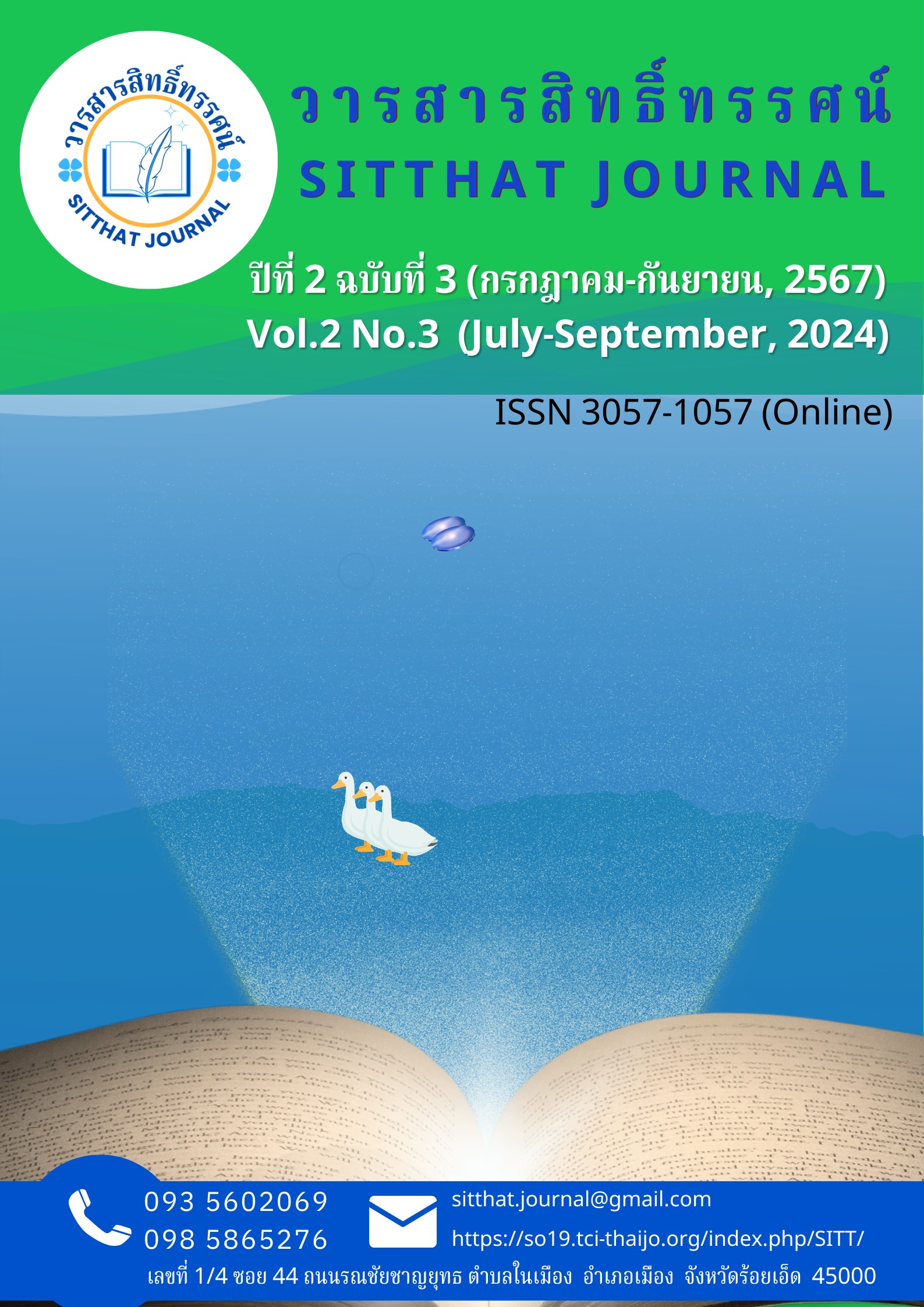FACTORS INFLUENCING THE APPLICATION OF THE PRINCIPLES OF MERIT - MAKING BYORGANIZATIONAL ADMINISTRATORS PHAYAO PROVINCIAL ADMINISTRATION
Main Article Content
Abstract
The objectives of this research are (1) to study the application of the principles of meritorious karmapatha by executives of the Phayao Provincial Administrative Organization (2) to study factors influencing the application of the principles of meritorious karmapatha by administrators of the Phayao Provincial Administrative Organization, and (3) ) to study the guidelines for applying the principles of merit-making by Phayao Provincial Administrative Organization administrators The sample group included 316 personnel in the Phayao Provincial Administrative Organization and the target group included Executives and department heads in Phayao Provincial Administrative Organization, totaling 10 people, the researcher used a mixed methods research method Between qualitative and quantitative research Using quantitative research using frequency distribution statistics and percentage of respondents Analyzed by presenting in tables using mean statistics and standard deviation Multiple regression analysis using sequential variable selection method Accompanying the discussion of results and descriptive data analysis by selecting and classifying data Organize information systematically Prepare data editors and analyze data Then use the data to write a report according to the objectives of the research study. The research results found that: (1) Application of the principles of meritorious conduct by administrators of the Phayao Provincial Administrative Organization. Overall, it is at a moderate level. They can be arranged in descending order as follows: The most valuable aspect is the application of the principles of meritorious karmapatha. Followed by: aspects of implementing the principles of meritorious karmapatha and evaluation aspects of applying the principles of meritorious karmapatha) respectively (2) Factors influencing the application of the principles of merit-making by Phayao Provincial Administrative Organization administrators. Importantly, they include the caring aspect (X4), the participation aspect (X3), and the practical approach (X1). The coefficients of the predictors in the raw score (b) were equal to .425, .278, and .044. respectively and (3) It is necessary to encourage administrators to see the benefits of keeping precepts and the dangers or consequences of not having precepts, both direct and indirect Benefits such as one's own happiness. Gain trust resulting in the trust of the people to continue working. There is happiness and peace within the local area, etc As for the penalties or consequences of not having precepts, such as not being trusted. This may result in not being elected in the next election, etc. In addition, mindfulness should be encouraged. Think before you speak and act. Think about the consequences that will happen to both yourself and society. Emphasis is placed on leaders realizing that they are role models for people in the area if executives do good things People will follow this example. But if you do wrong morally People who see it may imitate it to be effective in managing the organization effectively.
Article Details

This work is licensed under a Creative Commons Attribution-NonCommercial-NoDerivatives 4.0 International License.
บทความนี้
References
กัลยา วานิชย์บัญชา.(2560). การวิเคราะห์สถิติชั้นสูงด้วย SPSS for Window (พิมพ์ครั้งที่ 12). กรุงเทพฯ:
ห้างหุ้นส่วนจํากัด สามลดา.
โกวิทย์ พวงงาม. (2554). การปกครองท้องถิ่น: ว่าด้วยทฤษฎี แนวคิด และหลักการ. กรุงเทพฯ: เอ็กซเปอร์
เน็ท.
กรมส่งเสริมการปกครองส่วนท้องถิ่น. (2560). รายงานสรุปผลการประเมินประสิทธิภาพขององค์กรปกครอง
ส่วนท้องถิ่นประจำปี 2560. กรุงเทพฯ: กรมส่งเสริมการปกครองส่วนท้องถิ่น.
จินตวีร์ เกษมศุข. (2559). หลักการมีส่วนร่วมกับการพัฒนาชุมชนอย่างยั่งยืน. กรุงเทพฯ: สำนักพิมพ์แห่ง
จุฬาลงกรณ์มหาวิทยาลัย.
ธวัชชัย วรรณวงค์ และคณะ. (2558). การประยุกต์ใช้หลักกุศลกรรมบถของผู้บริหารองค์การบริหารส่วนตำบล
หนองทัพไทย อำเภอพนมไพร จังหวัดร้อยเอ็ด. วารสารธรรมทัศน์, 15(2), 69 – 76.
พระดำรงค์ สุมงฺคโล (อธิสุมงคล). (2565). การประยุกต์ใช้หลักกุศลกรรมบถ 10 ในการลดพฤติกรรมก้าวร้าว
ของเยาวชนในชุมชนหมู่บ้านบุฮม ตำบลบุฮม อำเภอเชียงคาน จังหวัดเลย. วารสารสถาบันวิจัยพิมล
ธรรม, 9(2), 151 – 162.
พระธรรมโกศาจารย์. (2554). พุทธธรรมกับการพัฒนาสังคมและเศรษฐกิจ. กรุงเทพฯ: 21 เซ็นจูลี่ จำกัด.
เรืองวิทย์ เกษสุวรรณ. (2555). แนวคิดทฤษฎีการปกครองส่วนท้องถิ่น. กรุงเทพฯ: บพิธการพิมพ์ จำกัด.
วีระศักดิ์ เครือเทพ. (2558). 15 ปี การกระจายอำนาจให้องค์กรปกครองส่วนท้องถิ่นไทย. กรุงเทพฯ:
สำนักงานปลัดสำนักนายกรัฐมนตรี.
สว่างบุญ วงก์ฟ้าเลื่อน. (2566). การประยุกต์ใช้หลักกุศลกรรมบถในพระพุทธศาสนา เพื่อเสริมสร้างคุณภาพ
ชีวิตมนุษย์ในสังคมดิจิทัล. วารสารพุทธพัฒนศาสตร์ศึกษา, 1(1), 64 – 80.
Yamane, Taro. (1973). Statistics an introductory analysis. New York Harper & Row.


